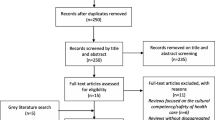Abstract
There is a paucity of information about the health beliefs that older adults in the United Arab Emirates (UAE) hold. This is a serious omission as understanding people’s ideas about health maintenance and disease prevention informs public health policy and practice. Using a qualitative methodology, twenty-three community dwelling adults aged between sixty and eighty years were interviewed. The data were analyzed to uncover the meanings of health and health beliefs ascribed by the participants within their narratives. Participant narratives revealed representations of health that were in close alignment with previous research. ‘Health as value’ also emerged as a distinct health belief. Analysis of the interview data identified three superordinate themes labeled ‘Health is what you eat’; ‘Health was better in the past’; and ‘Health is from God’ as factors that participants attributed to their health. The implications for the health care system in the UAE are discussed. As the first study of its kind within the UAE, this study provides a solid base from which future studies exploring health beliefs and social representations of health can build upon.
Similar content being viewed by others
References
Ali, H. I., Baynouna, L. M., & Bernsen, R. M. (2010). Barriers and facilitators of weight management: perspectives of Arab women at risk for type 2 diabetes. Health and Social Care in the Community, 18(2), 219–228.
Antonovsky, A. (1979). Health, stress and coping. San Francisco: Jossey-Bass.
Antonovsky, A. (1996). The salutogenic model as a theory to guide health promotion. Health Promotion International, 11(1), 11–18.
Blaxter, M. (1990). Health and lifestyles. London: Routledge.
Flick, U. (1998). The social conbstruction of individual and public health: contributions of social representations theory to a social science of health. Social Science Information, 37(4), 639–662.
Flick, U., Niewiarra, S. (1994). Alltag, Lebensweisen und Gesundheit. Berlin: University of Technology, Berlin, report no -94-95 of the Institute of Psychology.
Halligan, P. (2007). Belief and illness. The Psychologist, 20(6), 358–361.
Heider, K. G. (1991). Landscapes of emotion: Mapping three cultures of emotion in Indonesia. Cambridge: Cambridge University Press.
Helman, C. (1978). ‘Feed a cold and starve a fever’—Folk models of infection in an English suburban community and their relation to medical treatment. Culture, Medicine and Psychiatry, 2, 107–137.
Herzlich, C. (1973). Health and illness. London: Academic.
Langdridge, D. (2007). Phenomenological psychology: Theory, research and method. Harlow: Prentice Hall.
Margolis, S. A., Carter, T., Dunn, E. V., & Reed, R. L. (2003). The health status of community based elderly in the United Arab Emirates. Archives of Gerontological Geriatrics, 37, 1–12.
Moscovici, S. (1988). Notes towards a description of social representations. European Journal of Social Psychology, 18, 211–250.
National Bureau of Statistics (2010). 2005 Census: Population by Age Group 1975–2005. Available via the UAE National Bureau of Statistics. http://www.uaestatistics.gov.ae/ReportDetailsEnglish/tabid/121/Default.aspx?ItemId=1868&PTID=104&MenuId=1 Accessed 28th August 2011.
Nettleton, S. (1995). The sociology of health and illness. Cambridge: Polity Press.
Osborn, M., & Smith, J. A. (1998). The personal experience of chronic benign lower back pain: an interpretative phenomenological analysis. British Journal of Health Psychology, 3, 65–83.
Phoenix, C., Smith, B., & Sparkes, A. C. (2010). Narrative analysis in aging studies: a typology for consideration. Journal of Aging Studies, 24, 1–11.
Ruth, J.-E., & Kenyon, G. (1996). Biography in adult development and aging. In T. Svensson (Ed.), Aging and biography (pp. 1–21). New York: Springer Publishing Company.
Sarafino, E. P. (2008). Health psychology: Biopsychological interactions (6th ed.). Hoboken: Wiley.
Sidell, M. (2007). Older people’s health: Applying Antonovsky’s Salutogenic paradigm. In J. Douglas, S. Earle, S. Handlsey, C. E. Lloyd, & S. Spurr (Eds.), A reader in promoting public health (pp. 33–38). Sage: London.
Smith, J. A. (1996). Evolving issues in qualitative psychology. In J. Richardson (Ed.), Handbook of qualitative research methods for psychology—the social sciences. Leicester: British Psychological Society.
van Manen, M. (1990). Researching lived experience. New York: State University of New York Press.
Acknowledgements
Support to complete this project was provided by the award of the Zayed University Provost’s Research Fellowship 2011.
Ethical Standards
University ethical approval was sought and given prior to participants being identified and approached to participate. The study was explained in full to each participant. They were informed about the nature of the study and that they would not be identified personally but would be give a pseudonym. They were also informed that the data would be stored securely and only accessible to the research team comprising the interviewer, two other research assistants and the author. Once they had agreed to take part the content of the consent form was also explained in detail. Only after each participant acknowledged they understood what was expected from them, were they invited to sign the consent form.
Conflict of Interest
There are no conflicts of interest. Financial support for the payments made to research assistants was provided from the Zayed University Research Incentive Fund, grant number R0917.
Author information
Authors and Affiliations
Corresponding author
Rights and permissions
About this article
Cite this article
Campbell, C. Health Beliefs of Community Dwelling Older Adults in the United Arab Emirates: A Qualitative Study. Ageing Int 40, 13–28 (2015). https://doi.org/10.1007/s12126-012-9148-1
Published:
Issue Date:
DOI: https://doi.org/10.1007/s12126-012-9148-1




